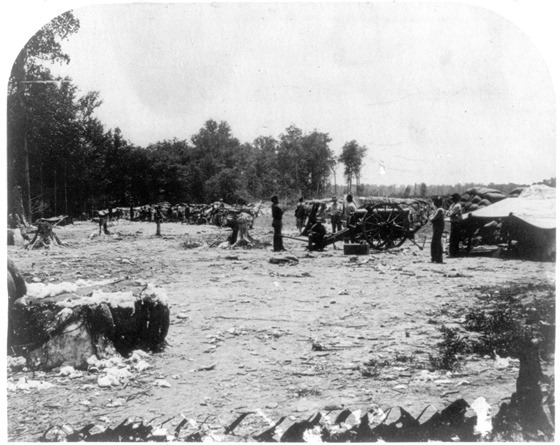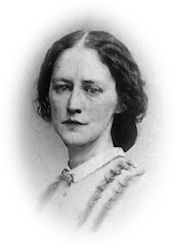Jane Stuart Woolsey to a friend in Europe.
Washington, May 25.
We have just been spending a month in Washington, my first visit since the war, and the city certainly looks like war-time, the white tents showing out of the green of all the hills, headquarters’ flags flying above all the remaining bits of wood, and everywhere on the highish places, the long, low, dun banks of earthworks you get to detect so soon, looking like a western river levee. Then it is strange not to be able to go in the ferry-boat to Alexandria, or take an afternoon drive across the bridges into the country, without producing a document which sets forth over your names in full,—men and women,—that your purpose is pleasure visiting, and that you solemnly affirm that you will support, protect and defend the Government, etc., against all enemies, domestic or foreign, etc., any law of any State to the contrary notwithstanding, so help you God. It was odd, too, at the opera one night, to see an officer of the Provost Guard come into the theatre between the acts and accost the gentlemen in front of us: “Sorry to trouble you, Major; your pass if you please”; and so, to every pair of shoulder-straps in the house. Then there are the great Barrack hospitals and the dwelling-houses turned into hospitals, the incessant drum-beat in the streets and the going and coming of squads of foot and horse, the huge packs of army-wagons in vacant lots, the armed sentinels at the public buildings, and all the rest of it. Washington certainly shows the grim presence. It is a calumniated city in some respects. It is as bright and fresh this springtime as any town could be. The sweet, early, half-southern spring is nowhere sweeter than in the suburbs of Washington; on the Georgetown Heights, as we drove with Dr. Bacon up the river-edges to the Maryland forts or the great new arch “Union” of the new aqueduct, or down the river-edges by the horrible road, or went on a little breezy rushing voyage in a quartermaster’s tug to Mount Vernon to see Miss Tracy, the lady who lives all alone with the Great Ghost,—all these little excursions are most charming. . . . But some days of our visit were dark ones,—the three or four inevitable days of doubt and lying despatches at the time of the Chancellorsville battles; then the days when the truth came partially out (Mr. Sumner told one of our party last week that it has never yet come out); then the days when the wrecks drifted in, hospitals filled up and our hotel, being a quiet one, became almost a hospital for wounded officers. In the evening we used to hear the tugs screaming at the wharf; soon after, carriages would drive up, a servant get out with one or two pairs of crutches, then a couple of young fellows, painfully hoisted upon them, would hobble in. Some were brought on stretchers. Then one day came our friends, Frank Stevens, 1st New York, shot through the knee, and Captain Van Tuyl, shot through both legs; then Lieutenants Asch and Kirby, one, arm gone, one, leg gone; then Palmer and Best of the t6th, etc. Stevens was left on the field at Chancellorsville, taken prisoner, sadly neglected. But it is astonishing to see the cheerful courage of these young men. I went to see Captain Bailey, 5th Maine, with superfluous condolences. “In six weeks I shall be in the service again; if they can’t make me a marching leg I’ll go into a mounted corps; you don’t suppose I call that a ‘disability’!” pointing to where his right leg used to be; lying, pale and plucky, encouraging three other more or less mutilated men in the same room with him; and much more in the same strain, like the music of Carryl, “pleasant and mournful to the soul.” We saw a long train of rebel prisoners come in, not by any means, I am bound to say, ragged or gaunt or hungry-looking; dirty, of course, with queer patchwork quilts in many cases for blankets; some without shoes, some without hats, but fighting men, not starvelings, every one of them. Our friend Major Porter came up on the tug with one detachment. They opened their haversacks and ate their rations, which consisted in every case of crackers and sugar. One young fellow brought his blanket and spread it by Major Porter, to take a nap, saying, “Would you please wake me up, sir, when we pass Mount Vernon ? I’d like to take off my hat when we come to the place where Gentleman George Washington lived.” . . . None of us know much about the retreat and the “reason why.” The President was anxious and restless in those days, and went down to the tugs two or three times to see and talk with wounded officers. Georgy met him by chance one morning in the White House garden, and found him greatly changed since last summer. He was walking slowly, eating an apple, dragging “Tad” along by the hand and gazing straight before him, afar off,—older, grayer, yellower, more stooping and harassed-looking. . .
Jane’s letter, given above, happily contains also extracts from one of Charley’s, after the Battle of Chancellorsville.
He writes May 8th: “We have forced the enemy out of their works and made them fight us in the open, but instead of their ‘ignominiously flying,’ we have retired in good order to
the other side of the Rappahannock, and are in our old camp again, bitterly regretting that we pulled down our chimneys when we went forward. And why did we come back? Nobody knows. It was not the storm, for when the order was given it was fine weather. Our position was strong. Everybody thought we could hold it for any length of time. I have been on the go of course, day and night; no rest for the A.D.C. On Thursday night (April 30) I was sent to Potomac Creek to look for a missing battery; then to the bridges to report progress; was on duty the rest of the night opening despatches, and back and forth all next day with orders to Gibbon. At 11.45 Saturday night I delivered to Sedgwick General Hooker’s orders to cross the river at once, march on Fredericksburg, capture everything in it and march by the flank road to Chancellorsville. The night march began immediately. At 50.30 next morning I found Sedgwick in one of the houses in the town and gave him the General’s order to attack. He charged on the heights splendidly. Later in the day I took the order to General Gibbon to hold the town, and then went to Sedgwick, three miles beyond the town, to report progress. He was resting on the hills we have been looking at all winter. I reported to General Hooker up the river. The General said to me, ” Mr. Woolsey, you will remain with me and take in all despatches that come.” So I saw only Meade’s fight, and was favored with communitions from “Father Abraham,” (who knew very little of what was going on); from Peck, who ought to have walked into Richmond, and from corps commanders. On Tuesday night the army re-crossed about dark, the General started off suddenly and the staff scattered. He was just in time, the Rappahannock was rising, the pontoons shifting. I had to jump my horse from the last boat and wade him 20-30 feet, quite deep. The crossing of the artillery and infantry was tediously delayed. After some search I found General Hooker on the back porch of a little house high up on the river’s bank; the front rooms were filled with wounded. There were only three or four men with him; he looked very dejected and sad. The wet troops outside were toiling by in the mud and dark, in full retreat. The General and Butterfield nodded in their chairs before the fire. It was a melancholy sight. The General sent me repeatedly to report from the bridges. ‘Tell them,’ he sent word, with great solemnity, `tell them that the lives of thousands depend upon their efforts.’ All night and all the early morning the troops came slowly in. It was with great difficulty that I could stem the crowd on the bridges to get back with messages to Meade, who was covering the rear. He expected to be harassed, but I do not know of a shot being fired. We are all very much disappointed, but do not believe that we are demoralized. I have heard hard things said of Hooker. Some of the headquarters men use his name in a way that ought to be punished as rank insubordination. The congratulatory order is the subject of many sarcastic remarks. On authority I may state that this army will be filled up with conscript men, and I am disposed to think that Providence never intended the A. P. for anything but an army of observation. Let Hitchcock succeed Halleck and Dan Sickles Hooker, and I think we may all go abroad to live, with a clear conscience.”












